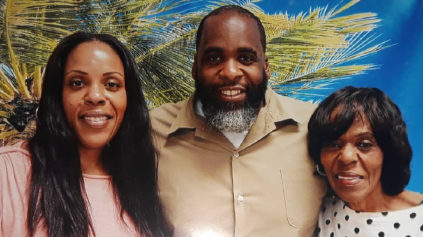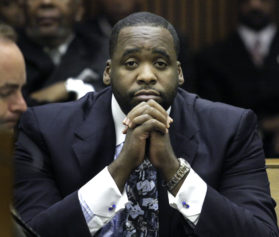Former Detroit Mayor Kwame Kilpatrick could find himself behind bars once again, pending the results of a court hearing next Wednesday.
Kilpatrick will appear in front of Wayne County Circuit Court Judge David Groner, the same man who sent him to jail in 2008. Though Kilpatrick was released from prison in August 2011, he is still required to report to a parole officer and make regular restitution payments to the Wayne County Prosecutor’s office.
The exact reason for Kilpatrick’s court appearance has not been announced, but there are a number of factors that could impact the former mayor’s status as a free man. Most recently, Kilpatrick missed his last restitution payment of $500, which would go toward the $856,062.60 he still owes the city. He has also challenged the state’s control over the proceeds from his memoir, Surrendered: The Rise, Fall, & Revelation of Kwame Kilpatrick, which are currently directed to an account to pay toward the restitution agreement.
Kilpatrick was also in danger of receiving a parole violation after failing to report his completed community service hours, which had already been carried over from October into November. Though the state appears to offer some leniency to the former mayor, he may be stretching his luck.
“It is becoming clear that Mr. Kilpatrick has not been abiding by the terms of his parole,” Assistant Wayne County Prosecutor Maria Miller told The Detroit News. “It is the responsibility of the Michigan Department of Corrections to deal with this situation.”
Along with his father, Bernard, and friend Bobby Ferguson, Kilpatrick is still on trial in federal court for extortion, corruption and bribery. An IRS agent recently testified that the elder Kilpatrick deposited $605,000 into the bank over a span of seven years without any evidence as to where the money came from. Defense attorney John Shea suggested that the money could have come from his gambling earnings.
Karl Kado, a key witness in the case, testified earlier in the week that the defendants had extorted money from him about 10 years ago. The 72-year-old businessman admitted to FBI agents that he may be developing dementia, but says that he was extorted in fear that he would lose business in the city’s Cobo Center. Despite the possibility of mental illness, Kado’s testimony that he paid the Kilpatricks between $200,000 and $300,000 is supported by phone calls recorded by the FBI, during which Kado asks for money owed to him by the city.
Kilpatrick’s federal trial is expected to continue into next year, but depending on his parole hearings, he may not need hear that verdict before he returns to prison.


